The Figure shown below represents an activity to prove the requirements for photosynthesis. During this activity, two healthy potted plants were kept in the dark for 72 hours. After 72 hours, KOH is kept in the watch glass in setup X and not in setup Y. Both these setups are air tight and have been kept in light for 6 hours. Then, Iodine Test is performed with one leaf from each of the two plants X and Y.
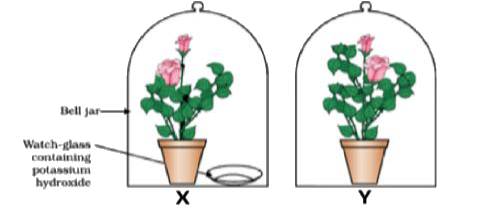
This experimental set up is used to prove essentiality of which of the following requirements of photosynthesis?
Chlorophyll
Oxygen
Carbon dioxide
Sunlight
Step by step video & image solution for The Figure shown below represents an activity to prove the requirements for photosynthesis. During this activity, two healthy potted plants were kept in the dark for 72 hours. After 72 hours, KOH is kept in the watch glass in setup X and not in setup Y. Both these setups are air tight and have been kept in light for 6 hours. Then, Iodine Test is performed with one leaf from each of the two plants X and Y. This experimental set up is used to prove essentiality of which of the following requirements of photosynthesis? by Chemistry experts to help you in doubts & scoring excellent marks in Class 10 exams.
Updated on:21/07/2023Topper's Solved these Questions
- SAMPLE PAPER 2022BOOK - CBSE MODEL PAPERCHAPTER - SAMPLE PAPER 2022EXERCISE - ALTERNATIVE QUESTIONS(SECTION A)
3 Videos
- SAMPLE PAPER 2022BOOK - CBSE MODEL PAPERCHAPTER - SAMPLE PAPER 2022EXERCISE - ALTERNATIVE QUESTIONS(SECTION B)
3 Videos
- SAMPLE PAPER 2022BOOK - CBSE MODEL PAPERCHAPTER - SAMPLE PAPER 2022EXERCISE - SECTION - B
9 Videos
- Additional Practice QuestionsBOOK - CBSE MODEL PAPERCHAPTER - Additional Practice QuestionsEXERCISE - Question
16 Videos
- SAMPLE PAPER 2022 TERM IIBOOK - CBSE MODEL PAPERCHAPTER - SAMPLE PAPER 2022 TERM IIEXERCISE - SECTION B
4 Videos
Similar Questions
The Figure shown below represents an activity to prove the requirements for photosynthesis. During this activity, two healthy potted plants were kept in the dark for 72 hours. After 72 hours, KOH is kept in the watch glass in setup X and not in setup Y. Both these setups are air tight and have been kept in light for 6 hours. Then, Iodine Test is performed with one leaf from each of the two plants X and Y.
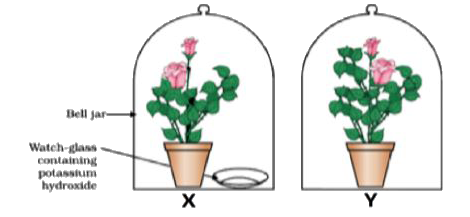
The function of KOH is to absorb
View SolutionThe Figure shown below represents an activity to prove the requirements for photosynthesis. During this activity, two healthy potted plants were kept in the dark for 72 hours. After 72 hours, KOH is kept in the watch glass in setup X and not in setup Y. Both these setups are air tight and have been kept in light for 6 hours. Then, Iodine Test is performed with one leaf from each of the two plants X and Y.
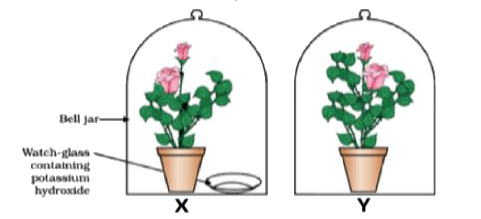
Which of the following statements shows the correct results of Iodine Test performed on the leaf from plant X and Y respectively?
View Solution
Knowledge Check
Case : The Figure shown below represents an activity to prove the requirements for photosynthesis. During this activity, two healthy potted plants were kept in the dark for 72 hours. After 72 hours, KOH is kept in the watch glass in setup X and 'not in setup Y. Both these setups are air tight and have been kept in light for 6 hours. Then, lodine Test is performed with one leaf from each of the two plants X and Y.
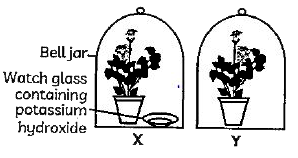
The function of KOH is to absorb :AOxygenBCarbon dioxideCMoistureDSunlightCase : The Figure shown below represents an activity to prove the requirements for photosynthesis. During this activity, two healthy potted plants were kept in the dark for 72 hours. After 72 hours, KOH is kept in the watch glass in setup X and 'not in setup Y. Both these setups are air tight and have been kept in light for 6 hours. Then, lodine Test is performed with one leaf from each of the two plants X and Y.
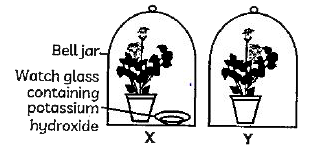
Which of the following statements shows the correct results of lodine Test performed on the leaf from plant X and Y respectively?ABlue - black colour would be obtained on the leaf of plant X and no change in colour on leaf of plant Y.BBlue - black colour would be obtained on the leaf of plant Y and no change in colour on leaf of plant X.CRed colour would be obtained on the leaf of plant X and brown colour on the leaf of plant Y.DRed colour would be obtained on the leaf of plant Y and brown colour on the leaf of plant X.Case : The Figure shown below represents an activity to prove the requirements for photosynthesis. During this activity, two healthy potted plants were kept in the dark for 72 hours. After 72 hours, KOH is kept in the watch glass in setup X and 'not in setup Y. Both these setups are air tight and have been kept in light for 6 hours. Then, lodine Test is performed with one leaf from each of the two plants X and Y.
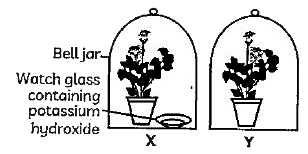
Which of the following steps can be followed for making the apparatus air tight?
(I) placing the plants on glass plate
(II) using a suction pump.
(III) applying aseline to seal the bottom of jar.
(IV) creating vacuumA(I) and (III)B(II) and (III)C(I) and (IV)D(II) and (IV)
The Figure shown below represents an activity to prove the requirements for photosynthesis. During this activity, two healthy potted plants were kept in the dark for 72 hours. After 72 hours, KOH is kept in the watch glass in setup X and not in setup Y. Both these setups are air tight and have been kept in light for 6 hours. Then, Iodine Test is performed with one leaf from each of the two plants X and Y.
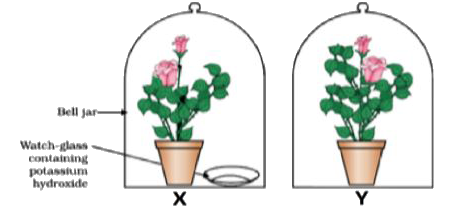
Which of the following steps can be followed for making the apparatus air tight?
i. placing the plants on glass plate
ii. using a suction pump.
iii. applying aseline to seal the bottom of jar.
iv. creating vacuum
View SolutionA student was–performing an activity to prove the requirements for photosynthesis. During this activity, he kept two identical healthy potted plantsA and Bin dark for 72 hours. After 72 hours, he covered plant A and B by bell shaped jars separately. While covering the plants with separate bell jars, he kept KOH in the watch glass by the side of the plant in setup A and not in setup B. Both these setups were made air tight and were kept in light for 6 hours. Then, Iodine Test was performed with one leaf from each of the two plants A and B.
This experimental set up is used to prove essentiality of which of the following requirements of photosynthesis?
View SolutionA student was–performing an activity to prove the requirements for photosynthesis. During this activity, he kept two identical healthy potted plantsA and Bin dark for 72 hours. After 72 hours, he covered plant A and B by bell shaped jars separately. While covering the plants with separate bell jars, he kept KOH in the watch glass by the side of the plant in setup A and not in setup B. Both these setups were made air tight and were kept in light for 6 hours. Then, Iodine Test was performed with one leaf from each of the two plants A and B.
Which of the following statements shows the correct results of Iodine Test performed on the leaf from plant A and B respectively?
View SolutionA student was–performing an activity to prove the requirements for photosynthesis. During this activity, he kept two identical healthy potted plantsA and Bin dark for 72 hours. After 72 hours, he covered plant A and B by bell shaped jars separately. While covering the plants with separate bell jars, he kept KOH in the watch glass by the side of the plant in setup A and not in setup B. Both these setups were made air tight and were kept in light for 6 hours. Then, Iodine Test was performed with one leaf from each of the two plants A and B.
The function of KOH is to absorb
View SolutionA student was–performing an activity to prove the requirements for photosynthesis. During this activity, he kept two identical healthy potted plantsA and Bin dark for 72 hours. After 72 hours, he covered plant A and B by bell shaped jars separately. While covering the plants with separate bell jars, he kept KOH in the watch glass by the side of the plant in setup A and not in setup B. Both these setups were made air tight and were kept in light for 6 hours. Then, Iodine Test was performed with one leaf from each of the two plants A and B.
Which of the following steps can be followed for making the apparatus air tight?
i. placing the plants on glass plate
ii. using a suction pump.
iii. applying Vaseline to seal the bottom of jar.
iv. creating vacuum
View Solution
